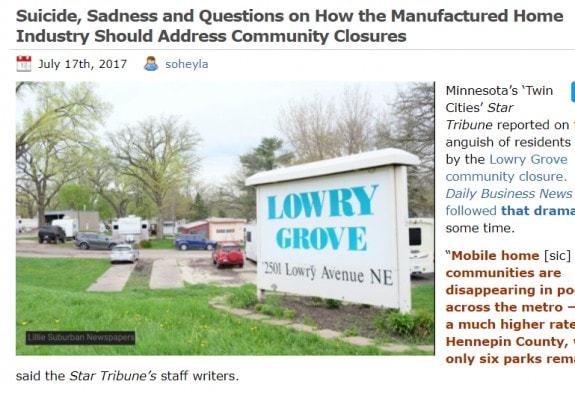
According to a report to MHProNews by the Minnesota Manufactured Housing Association (MMHA), the Department of Housing and Urban Development (HUD) just finished an investigation that set out to determine whether or not community residents were denied the first right of refusal to buy the now-closed, Lowry Grove.
Under Minnesota law, homeowners in a manufactured housing community automatically get the first right of refusal if the community owner wants to sell the property.
That law provides a path for the community to stay together as a cooperative. In the case of a possible redevelopment, it may mean the difference between keeping your manufactured home, or being forced to move homes to a new location…
…if that alternative locale is available.
The Daily Business News has previously reported on the impact the closure had on residents.

Here’s the ruling, per MMHA.
“Regarding its dismissal of the disparate impact claim, HUD stated;
To establish a prima facie case of discrimination in violation of Sections 804(a) and 804(b) of the Act based on disparate impact, the following elements must be met:
- The policy or practice in question negatively affects a particular protected class to a much greater extent than it affects others; and
- The disparity is actually caused by the policy or practice in question.
The first element has not been met because Complainants have not identified a facially neutral, generally applicable policy or practice; rather, they have identified a single act or decision of Respondent Lowry Grove to sell the Park to Respondent Village. Secondly, most of the residents of the Park are non-Hispanic and presumably, low income, thus, in all likelihood, the decision does not have a greater impact on Hispanic residents.
The second element is also not met because there is no policy or practice identified by Complainants. Rather, there is a single occurrence of the sale of the Park.
- CONCLUSION
For the reasons set forth above, there is no reasonable cause to believe that the Act was violated, as alleged. This Determination only addresses the violations of the Act alleged in the complaint and does not address any potential violations of any other provision of law. A determination is limited to the facts developed in a specific investigation and is not a determination of compliance with all requirements of the Act.”

Interestingly, the investigation closed about the same time as some sort of additional relocation compensation for residents was agreed on by the city and the developer.
If you would like to read the full report from the Minnesota Manufactured Housing Association, click here.

To see a recent and related article on Rep. Keith Ellison’s proposal for avoiding community closures, click here. ##
(Image credits are as shown above, and when provided by third parties, are shared under fair use guidelines.)

